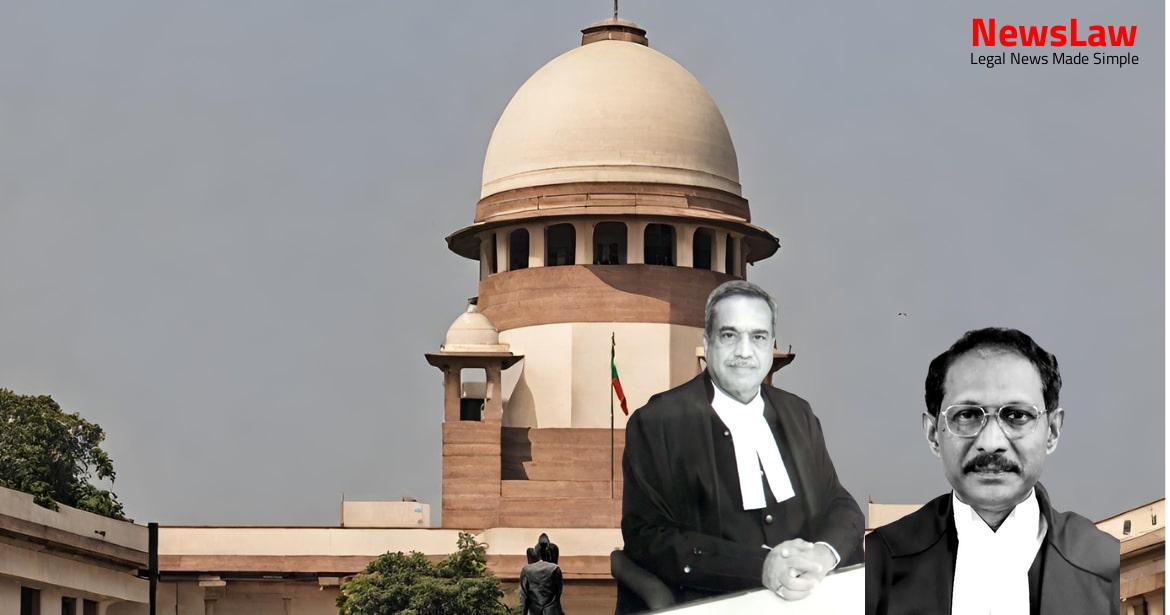In a significant legal development, the Supreme Court of India recently issued a landmark judgment regarding rent arrears and tenants’ compliance with the law. The case involved a dispute between the High Court and tenants over non-payment of arrears, raising crucial questions about legal obligations and eviction. Stay tuned for more insights on this impactful ruling.
Facts
- The respondent filed an eviction petition against the appellants for non-payment of arrears of rent for two shops.
- The appellant claimed that they were not informed by the Receiver about the authorized person to collect rent.
- The appellants filed an application under Section 7(2) of the West Bengal Premises Tenancy Act, 1997, which was initially allowed but later set aside by the Learned Single Judge.
- The High Court of Calcutta passed an order on 13.05.2016 in two separate eviction petitions filed by the respondent against the two tenants.
- The appellants did not deposit any rent but applied to determine the arrears of rent, stating that they had paid rent up to June 1993 to the Receiver.
- Trial Court allowed the application and determined arrears of rent.
- Learned Single Judge found that the order passed by a Coordinate Bench did not decide the lis and did not provide principles for the Trial Court.
- The Trial Court decision was set aside by the Single Bench for following a different order by another Coordinate Bench.
Also Read: Lt. Col. Om Dutt Sharma vs. Ministry of Defence: OROP Entitlement for Army Postal Service Personnel
Arguments
- Learned counsel for the appellant argues that the High Court should have referred the matter to a larger Bench to decide the scope of Section 7(2) of the Act.
- The respondent’s counsel points out that previous judgments deal with Section 17 of the 1956 Act, which had different provisions compared to the current Act in question.
- The respondent’s counsel emphasizes that there is no equivalent overriding provision in the current Act as in Section 17(2A) of the 1956 Act.
- Reference is made to judgments such as Shibu Chandra Dhar v. Pasupati Nath Auddya and Gaya Prasad Kar v. Subrata Kumar Banerjee.
- The appellant’s counsel argues that the Limitation Act, 1963 should apply for seeking condonation of delay in filing an application under Section 7(2) of the Act.
- The Single Judge decided the matter on merits instead of referring it to a larger Bench.
- The Court needs to bring certainty concerning the scope of Section 7 of the Act.
- The appellant’s counsel asserts that Section 7(2) of the Act is similar to Section 17(2) of the West Bengal Premises Tenancy Act, 1956, discussed in a previous judgment B.P. Khemka Pvt. Ltd. v. Birendra Kumar Bhowmick.
- Reliance is placed on cases such as Monoj Lal Seal v. Octavious Tea & Industries Ltd, E. Palanisamy v. Palanisamy, and Balwant Singh v. Anand Kumar Sharma to determine when statutory provisions are considered as directory or mandatory.
- Calcutta High Court orders have established that non-deposit of arrears of rent can lead to the dismissal of the application under Section 7 of the Act.
- No error was found in the order passed by the High Court.
Also Read: Inheritance Dispute: Validity of Alleged Marriage between Sujathamma and Hanumanthappa
Analysis
- Prohibitive or negative words in a provision indicate mandatory nature.
- The use of ‘shall’ followed by such words signifies an absolute and imperative intention.
- The statutory provision must be interpreted as a command if in a negative form.
- In the context of the 1956 Act, clear intervals must be maintained between charges and arraignment.
- The power to extend the time for rent deposit under the 1956 Act is without restrictions.
- The tenant is required to file an application for determination of the rent payable.
- Deposit by the tenant within 15 days is not considered an application under Section 5 of the Limitation Act, 1963.
- The consequences of non-depositing rent are outlined in sub section (3) of Section 7 of the Act.
- Subsection (2) of the Act mandates depositing arrears of rent at the admitted rate along with an application for rent determination.
- The court may specify the amount due only after these conditions are met, and the tenant then has one month to pay the specified amount.
- The court’s discretion to extend the time for depositing arrears of rent is limited by the proviso of the Act.
- The provisions of sub section (2) are mandatory for tenants to follow to avoid eviction due to non-payment of arrears of rent.
- Section 7 of the Act provides a mechanism to avoid eviction based on arrears of rent if the tenant complies with the requirements of sub section (2).
- The Act has repealed the 1956 Act and made amendments with crucial distinctions such as sub sections (2A) and (2B).
- A delay in rent payment can be condoned under specific circumstances as indicated in the proviso of the Act.
- The Limitation Act does not apply to seek condonation of delay in filing applications under Section 7(2) of the Act.
- Non-payment of admitted arrears of rent within the specified timeframes can lead to the eviction of the tenant.
- Section 7 of the Act allows the tenant to avoid ejectment by paying arrears of rent with interest of ten per cent per annum.
- Section 6(1)(b) of the Act lists non-payment of rent for three months as a ground for eviction.
- Section 13(4) specifies the time limit for the tenant to deposit arrears of rent in court or pay to the landlord.
- The deposit must be made within three months or any extension granted by the Court.
Also Read: Seniority Determination in Uttarakhand Pey Jal Nigam: Regulation 23 vs Government Order
Decision
- The appeals are dismissed.
- Tenant cannot take recourse to Section 5 of the Limitation Act 18 since depositing admitted arrears of rent along with an application is required.
- No error found in the order passed by the learned Single Judge in view of the judgment in Nasiruddin.
- Trial Court to proceed with the suit in accordance with law.
- Deposit of rent along with an application for determination of dispute is a pre-condition to avoid eviction on the ground of non-payment of arrears of rent.
Case Title: BIJAY KUMAR SINGH Vs. AMIT KUMAR CHAMARIA
Case Number: C.A. No.-007849-007849 / 2019



